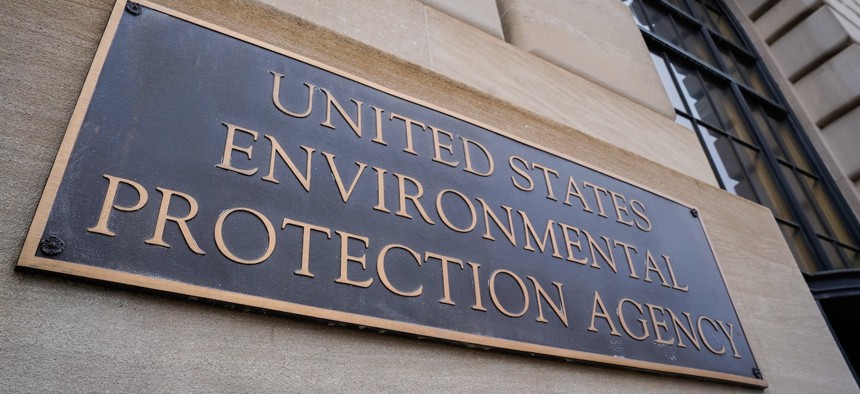
EPA’s document is not yet finalized and the agency is still soliciting input, but its initial version drew some criticism from scientific watchdog groups. J. David Ake/Getty Images
EPA has a new plan to protect career scientists, but some are questioning its efficacy
Solutions to concerns over accountability and reporting mechanisms are coming soon, EPA official says.
The Environmental Protection Agency is asking for employee feedback on its plan to protect career federal scientists from political influence and while early feedback from at least some of them is that the new policies are insufficient, EPA officials are pledging to be flexible and responsive to criticism.
EPA this month released its draft scientific integrity policy, which all agencies are currently revamping under a mandate from the White House’s Office of Science and Technology Policy. The document lays out how agencies should protect processes, conduct reviews, ensure the free flow of information, support scientific decision making and institute accountability while supporting employees.
The policy largely follows guidelines put forward in 2022 by President Biden’s Scientific Integrity Task Force, which he created by executive order shortly after taking office. Agencies in January were given six months to rework their policies, solicit feedback from OSTP and publicly release the updated documents, though few actually met that timeline.
While EPA’s document is not yet finalized and the agency is still soliciting input, its initial version drew some criticism from scientific watchdog groups. Public Employees for Environmental Responsibility, for example, said the document was too vague and left much of the detail to be determined at a future date. Punishments for violators of the policy were not spelled out, PEER said, and guidelines for investigating allegations of those violations were not sufficiently specific. The policy deputizes EPA’s scientific integrity officer to enforce “corrective and administrative actions,” but does not say what those should be. Agency leaders are also responsible for ensuring those disciplinary matters are carried out, though the policy does not make any prescriptive recommendations.
“The draft policy repeatedly declares its intent to prevent political suppression of scientific information, ensure prompt and full investigation of misconduct allegations, and protect scientists offering differing scientific opinions, but it lacks any concrete rules or procedures to accomplish these goals,” PEER said.
Anita Desikan, a senior analyst for the Center for Science and Democracy at the Union of Concerned Scientists, praised the new policy draft for encouraging professional development, empowering career employees to have final determinations on changes to scientific documents and generally promoting a culture where science is protected. She also found, however, the policy to be unspecific on topics such as promoting diversity and inclusion, enforcement mechanisms and how employees should report wrongdoing.
Francesca Grifo, EPA’s scientific integrity official, told Government Executive those complaints did not come as a surprise. Grifo co-chaired Biden’s integrity task force—which she called an “amazing process”—and its working group that released the governmentwide guidelines. She has been reading employee comments since they first began rolling in two weeks ago. The public comment period just opened on Wednesday.
“I agree, those things are not laid out in the policy,” Grifo said of the various complaints. “But they’re coming.”
She encouraged anyone with disagreements to spell those out specifically in their comments and those she has read so far have been “really thoughtful, really incredible” ideas.
“We don’t disagree that we need more details,” Grifo said. She suggested more specifics would be incorporated into the final policy, but some would have to be included in follow up documents. “To think we could put every detail necessary for every possibility into one document, we just can’t,” she said, adding it was necessary to first create a framework. “The rest of it will come, but you can’t run before you walk.”
Inquiries at EPA’s scientific integrity office spiked under President Trump, a concern Biden has highlighted in pushing for more rigorous scientific protections. In one case, dozens of employees—led by PEER—alleged then-EPA Administrator Andrew Wheeler and other top agency officials suppressed the work of its career employees and dismissed legitimate science in a key deregulatory action known as the Waters of the United States rule.
Kyla Bennett, PEER’s science policy director, said EPA’s scientific integrity shortcomings were “systemic” and a “growing threat to public health, while Jeff Ruch, the organization’s Pacific director, said a policy without enforcement mechanism “is just a bunch of hot air.” The group said EPA was attempting to steel itself against a future administration that could be more adversarial toward its scientists, but the draft failed to “pose any meaningful check against future political interventions.”
Grifo said she has worked tirelessly to ensure scientific integrity is embedded into EPA’s DNA, noting training and outreach efforts helped lead to a recent employee survey finding 90% of staff were familiar with the policy.
“Policy doesn’t solve everything, culture does,” she said. “Ultimately, culture is enduring.”
Desikan commended those efforts, saying they could help the agency find more enduring change than simply “playing whack-a-mole” as problems arise. She noted, however, that true cultural change requires all employees to be held to the same standard, and voiced concern that political appointees may not be under the revised policy. Language in the document to prevent employees from speaking out on policy, rather than scientific, matters could also prove problematic down the line.
“Under an administration that is less friendly to science, I could see them weaponizing those provisions,” Desikan said.
HHS became the first agency to release its updated plan last year, which also drew pushback from a variety of watchdog groups that said it lacked teeth to protect scientists. EPA’s plan follows those from HHS, the National Institutes of Health and the Consumer Products Safety Commission.







